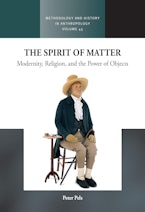- Home
- Vitality of Indigenous Religions
- religion
- social science
- Rethinking Relations and Animism

Rethinking Relations and Animism
Personhood and Materiality
Edited by: Miguel Astor-Aguilera and Graham Harvey
Series: Vitality of Indigenous Religions
224 Pages
- Hardcover
- ISBN: 9781138562349
- Published By: Routledge
- Published: October 2018
$140.00
Since Edward B. Tylor introduced the concept of animism as the foundation of religion in 1871, the literature on this topic has grown consistently in anthropology, archaeology, and religious studies under a wide range of theories and approaches. In this edited volume, the contributors rethink animism conceptually from a relational perspective which is highly influenced by the works of Bruno Latour, Philippe Descola, and Eduardo Viveiros de Castro, as well as the recent debates of the ontological turn.
Rethinking Relations and Animism: Personhood and Materiality, edited by Miguel Astor-Aguilera and Graham Harvey, consists of ten chapters, divided into three parts. The first part, titled “Relations,” offers contributions by three widely known specialists, Marshall Sahlins, Harvey, and Nurit Bird-David, where they discuss a relational approach to animism. The second part, “Things,” has three chapters that focus on the materiality of relations, and how materials dictate the terms of discussions on the ontology of things. Part 3, “Approaches,” discusses mainly indigenous approaches to relations and animism. In the four chapters that make up this third section, the authors describe different ethnographic and archeological examples where local indigenous knowledge plays a vital role in questioning the primacy of Western dichotomies in the analysis of culture.
What makes Rethinking Relations fascinating is its place in current debates on epistemology, ontology, indigenous post-colonial thinking, and materiality. As the editors mention in the introduction, the book takes a stance under what they call “the new relational turn,” which runs parallel to other approaches in the social sciences that have grown in popularity in the last decade—including the ontological turn, the object-oriented ontology, and the new animism. As it is impossible to describe the richness of each chapter of the volume, I will focus on the general contribution of this book for the anthropology of religion.
The idea that objects have a soul, or a life that animates them, becomes a universal scheme of the relationship between humans and things. As Sahlins mentions in chapter 1—his review of Descola’s book Beyond Nature and Culture (University of Chicago Press, 2013)—this scheme could stand in contrast to another ontological form, naturalism, which is the mode of classification that permeates Western knowledge and science.
Contrary to what Descola argues, what Sahlins describes is the extension of animism’s influence in culture and how it includes totemism and analogism in its configuration. For him, animism is the scheme that orders the cosmos, and gives vitality to the relationship between humans and non-humans, and between humans and things. This argument is revealing, as many of the chapters in the book will attest. Bird-David, for instance, explores animism through kinship in her resignification of the notions of the “relative” and the “person.” For her, the concept of the “person” becomes a quest for understanding other forms of non-binary relationships that are opposed to a Western way of thinking. Bird-David argues for a twofold form of animism: multispecies communities of relatives, and multiple human and nonhuman societies (which are organized in micro-communities). For her, grasping relations means to reassess the proliferation of multiplicities and the exploration of new concepts to describe alterity.
On the other hand, Harvey analyzes the difficulties about communicating the essence of animism. Like Bird-David, he argues in favor of a nonbinary approach to animism, what he calls “adjusted styles of communications.” This approach rejects the Cartesian dichotomy between body and soul, and object and spirit. For Harvey, part of the solution resides in exploring a relational multispecies view of assemblages that considers the knowledge of “alter-Native modernities”—native forms of thinking that place in the same symmetrical level anthropologists and indigenous knowledge.
The discussions on animism and personhood are grounded in ethnographic and archaeological material. All the chapters address the topic of animism creatively and show the power of interconnectedness in the constitution of humanity. From religious objects that mobilize communities, to the analysis of techno-animisms where robots and humans project agency in Japan, passing through the redefinition of Stonehenge and Mayan Polyontologies, Rethinking Relations is a book that will make a significant impact in anthropology, religious studies, and archaeology. Its power resides in offering a multiplicity of examples of relational forms of animism where the anthropologist and the Other play a respective complementary role in the definition of anthropological concepts. The inclusion of indigenous cosmologies in the last part of the book is a significant contribution to a dialogue between different modes of thinking. Animism thinks of itself through alterity, and the recognition of indigenous thought in its constitution sheds light onto the multiple forms of relatedness in the world, and it offers a different understanding of the connections between humans, nonhumans, and objects. In essence, Rethinking Relations gives us a refreshing view of traditional anthropological concepts, where notions like personhood, animism, and agency take on a whole new meaning, one that fulfills the ideal of what Latour has called a symmetrical anthropology.
Sergio González Varela is Professor of Anthropology in the Facultad de Ciencias Sociales y Humanidades at the Universidad Autónoma de San Luis Potosí.
Sergio González VarelaDate Of Review:May 22, 2019
Miguel Astor-Aguilera is Associate Professor of Religious Studies at Arizona State University.
Graham Harvey is Professor of Religious Studies at The Open University.











